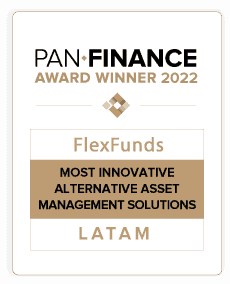In an economic environment of uncertainty like the current one due to a possible global recession, investors take more precautions to take care of their capital. Financial advisors become vital players in identifying opportunities to generate higher returns, but what are the keys to their excellent performance, and why are they so important in a situation like the current one?Navigating economic uncertainty and taking advantage of the opportunities that arise from any crisis is more complicated when you don’t have the right tools and financial advice, according to FlexFunds, a company specializing in the administration and distribution of investment vehicles (ETPs).When many investors are looking to safeguard their capital and make moves that allow them to generate returns, the lack of expertise and a structured investment plan can take its toll. Factors such as high-interest rates, inflation, and a possible recession should be more than ever kept in mind.The following are a few keys that some of today’s best financial advisors are applying:
1. Focus on planning:
In a scenario of uncertainty like the current one in the face of more aggressive monetary policies adopted in the wake of the pandemic and war in Ukraine, investors are again turning to financial advisors to get back to basics and focus on planning. A task they are very accustomed to and are putting the focus on today more than ever to restructure priorities. During this period, financial advisors are helping to take care of their client’s financial health based on stricter principles than before the crisis. Opportunities evaluating in detail and profitability margins are scrutinized, focusing on risk-mitigating alternatives that have already proven successful.Short-, medium- and long-term planning has never been as important as today, and financial advisors are setting these goals based on a detailed analysis of internal and external factors that play a transcendental role in the global economy.
2. Strengthen financial education
Hasty decisions, or even lack of reaction, led many investors to be left on the ropes during the pandemic, and now faced with new challenges, they are paying double the costs for their actions. This situation motivates advisors to focus more on their clients’ financial education to regain the confidence they lost during the crisis, consciously set goals, and analyze the signals that the markets are currently offering. Strengthening financial education among clients creates a more responsible environment, allowing financial advisors to add more value to their client’s portfolios as they gain a better understanding of the decisions and plan they have set to achieve their financial goals. Reyes Barquero, a financial advisor at Caser Asesores Financieros, told the Spanish newspaper El País that “financial education is an opportunity for the client to understand the need to have a financial advisor.” Added that “advising means gaining the client’s trust. Many ask us to make investments as if they were our own money, and that is impossible”.
3. Diversify portfolios even more:
Financial advisors become essential in a situation such as the present one, which calls for portfolio diversification to mitigate risk. In this context, betting on a single asset class can counter the investment plan’s goals.The expertise of financial advisors can help investors take positions in multiple options opening up in the post-pandemic period, including ETFs (exchange-traded funds), equities, and even currencies, as the dollar has strengthened over the past year, taking it to record highs in some emerging markets. According to online trading provider IG Group, one of the most efficient ways to diversify portfolios is to split capital between long and short-term trades. A diversification strategy should align with the investor’s risk profile, rigorous monitoring strategy, and regular client communication.
4. Manage emotions:
The coronavirus crisis demonstrated that human interactions have a relevance that transcends beyond everyday relationships. The confinement generated several challenges in managing emotions that financial advisory professionals still have to deal with today. A survey of 1,200 certified professionals by the Spanish Association of Financial Planners and Advisors (EFPA Spain) concluded that 96% of Spanish investors suffered anxiety and nervousness after the pandemic.Economic and financial uncertainty led 47.1% of advisors to identify symptoms associated with anxiety in their clients. In addition, 49% perceived their nervousness, which in most cases led these people to make bad decisions. The EFPA cites sources such as Oxford Risk to warn that this situation “can cause losses in investors’ portfolios in the medium and long term. Financial advisors are crucial in accompanying clients during moments of maximum tension.”
5. Taking expertise to the next level:
Financial advisors who are leading all these transformations are also accelerating their digital careers following the pandemic, which allowed them to move forward in adopting many solutions to engage with their clients. However, many know that digitalization efforts cannot stop there but must increasingly adopt tools such as automation, artificial intelligence, and data analytics. Many of these investments generate greater engagement and interaction with their customers. These tools also allow them to focus on critical issues and free themselves from administrative aspects that technology can solve nowadays. In addition, good use of the data generated by these tools allows them to understand their clients better, focus their strategies, and identify the most appropriate product type to diversify their portfolios. In short, the combination of these best practices supports the vital role played by financial advisors, who reaffirm their activity every day based on the speed at which economic changes occur. In this context, financial advisors cannot remain static but must continue to develop these skills by innovating and improving existing techniques to take the experience to the next level.
Sources:
https://cincodias.elpais.com/cincodias/2021/11/30/companias/1638311032_085352.html
https://www.ig.com/es/estrategias-de-trading/como-diversificar-tu-cartera-de-inversiones-201014#:~:text=La%20manera%20m%C3%A1s%20efectiva%20de,nivel%20de%20experiencia%20y%20objetivos
https://www.efpa.es/actualidad/14/noticias-efpa/2735/el-96-de-los-inversores-espanoles-sufrio-ansiedad-y-nerviosismo-tras-la-pandemia/







